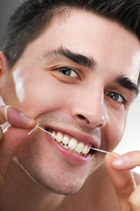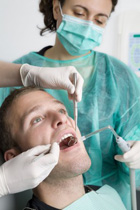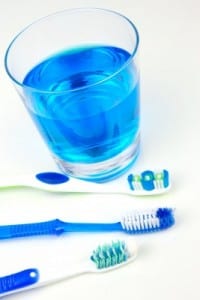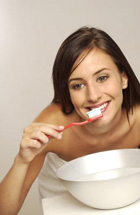 The oral health of children relies on the application of much the same principles as does the oral health of adults. The difference is that, if you have children, their oral health is your responsibility because they are in your care. As such, you will need to monitor it to make sure that their teeth are taken care of and they are not developing problems with their mouth that will be an issue for the rest of their lives.
The oral health of children relies on the application of much the same principles as does the oral health of adults. The difference is that, if you have children, their oral health is your responsibility because they are in your care. As such, you will need to monitor it to make sure that their teeth are taken care of and they are not developing problems with their mouth that will be an issue for the rest of their lives.
Children should be brushing their teeth twice a day, just as adults do. This is to ensure that plaque cannot cause dental cavities and initiate gum disease. Very young children might need an adult to brush their teeth for them and once they are old enough to brush themselves, as an adult you will still need to monitor them to make sure that they are brushing in the correct fashion. What you will need to look out for is that the tooth brush is easy for them to hold and manoeuvre around the mouth.
Children who are not yet two are advised not to use tooth paste that contains fluoride but once past that age, fluoride tooth paste is helpful because it will help to strengthen their enamel from an early age. What with the childhood propensity for sweet treats, it is important for parents to not only be in charge of when these treats are eaten and how often but also to ensure that teeth are adequately brushed afterwards.
Dentists in central Leeds can help you look after the teeth and gums of your children and can administer specialist treatments like the application of dental sealants to give added protection against decay.





 There are a number of things that only your dentist can do at his or her surgery. Procedures like root canal treatment and the fitting of braces are obvious but dentists can also contribute to the cleaning of teeth by using a special process that can only be carried out at the surgery. It is called scaling and polishing and it leaves you with that ‘dentist clean’ feeling in your mouth.
There are a number of things that only your dentist can do at his or her surgery. Procedures like root canal treatment and the fitting of braces are obvious but dentists can also contribute to the cleaning of teeth by using a special process that can only be carried out at the surgery. It is called scaling and polishing and it leaves you with that ‘dentist clean’ feeling in your mouth. If you have not flossed before then you are missing out on the benefits that this simple activity will convey on the health of your mouth. The high rates of gum disease in the United Kingdom are perhaps evidence that too few people are flossing or are flossing irregularly or not in the right way. If you are unsure about how you should floss and why then talk to your dentist. This article has the basic information.
If you have not flossed before then you are missing out on the benefits that this simple activity will convey on the health of your mouth. The high rates of gum disease in the United Kingdom are perhaps evidence that too few people are flossing or are flossing irregularly or not in the right way. If you are unsure about how you should floss and why then talk to your dentist. This article has the basic information. Advertising is relentless these days everywhere you look in central Leeds, and when it comes to looking after your teeth, it’s no different. But without being cold to those people behind the blurb that you have to contend with everyday, you shouldn’t write off any promotion when it comes to looking after your teeth without giving the product a look first. If you look after your teeth, you will live a healthy life, and when push comes to shove, it starts with the way you clean your teeth. Brushing is an important function in everyday life. It’s designed to stop bacteria from breeding in your mouth and causing such nightmares as tooth decay and gum disease. But it’s still incredible how some people still fail to get this right. It is also important to get the right brush and toothpaste to ensure you get the job done correctly. If you have any doubts what-so-ever that you are getting this wrong, crack along to your dentist and get some advice. Of course, the wonders of modern dentistry has also chucked into the mire of modern oral hygiene dental floss. A toothbrush alone cannot get up close and personal with the gums and get right in there where it matters- but dental floss can and it’s an excellent back-up to your everyday routine. Companies are coming up with so many ideas to make it blatantly easier for you to look after your teeth and are throwing so many types of flosses into the mix. If you mess up, you’ve only yourself to blame, because these people are laying it on a plate for you to keep your mouth healthy.
Advertising is relentless these days everywhere you look in central Leeds, and when it comes to looking after your teeth, it’s no different. But without being cold to those people behind the blurb that you have to contend with everyday, you shouldn’t write off any promotion when it comes to looking after your teeth without giving the product a look first. If you look after your teeth, you will live a healthy life, and when push comes to shove, it starts with the way you clean your teeth. Brushing is an important function in everyday life. It’s designed to stop bacteria from breeding in your mouth and causing such nightmares as tooth decay and gum disease. But it’s still incredible how some people still fail to get this right. It is also important to get the right brush and toothpaste to ensure you get the job done correctly. If you have any doubts what-so-ever that you are getting this wrong, crack along to your dentist and get some advice. Of course, the wonders of modern dentistry has also chucked into the mire of modern oral hygiene dental floss. A toothbrush alone cannot get up close and personal with the gums and get right in there where it matters- but dental floss can and it’s an excellent back-up to your everyday routine. Companies are coming up with so many ideas to make it blatantly easier for you to look after your teeth and are throwing so many types of flosses into the mix. If you mess up, you’ve only yourself to blame, because these people are laying it on a plate for you to keep your mouth healthy. Having a healthy mouth makes you feel good about yourself. There is nothing worse than walking around in your day to day life knowing that your mouth is not as healthy as it could be and putting up with aching teeth and sore gums. The best person to speak to about your oral hygiene is your Leeds dentist because he or she is an expert in all matters concerning your mouth.
Having a healthy mouth makes you feel good about yourself. There is nothing worse than walking around in your day to day life knowing that your mouth is not as healthy as it could be and putting up with aching teeth and sore gums. The best person to speak to about your oral hygiene is your Leeds dentist because he or she is an expert in all matters concerning your mouth. You only get one set of natural, healthy teeth so it is very much worth your while looking after them to the best of your ability. Thankfully oral hygiene is not rocket science and by following a simple set of advice you can look forward to a lifetime of having a set of healthy teeth.
You only get one set of natural, healthy teeth so it is very much worth your while looking after them to the best of your ability. Thankfully oral hygiene is not rocket science and by following a simple set of advice you can look forward to a lifetime of having a set of healthy teeth. There has been a lot written about the effectiveness of mouth-washes. Generally, it errs on the side that they are an unnecessary luxury that can actually do more harm than good to some people. But everyone is different in Leeds and as we know from all walks of life, it’s a case of horses for courses, and to dismiss mouth-washes as unnecessary might extremely premature. Most of them contain alcohol and salts, which are proven to be an enemy of bacteria and anything that attacks bacteria, can only be good for the mouth. Mouth-washes tend to be herded into two categories, therapeutic and cosmetic. Therapeutic ones work to fight plaque and gum disease, with plaque, the wash will contain ingredients that are proven to help in the buildup and removal of plaque, and with gum disease, the wash will contain oils, even herbal ingredients, that help to soothe the gums and help regenerate them. Cosmetic mouth-washes help beat dry mouth and bad breath, moistening the mouth during the rinse and promote saliva levels in the mouth. Basic mouth-washes often contain some elements of fluoride, the one element that can put minerals back into the enamel of the teeth. As well as this, flushing your mouth after eating is also a healthy way of removing sticky foods, breaking them down as it goes. Mouth-washes- unnecessary?
There has been a lot written about the effectiveness of mouth-washes. Generally, it errs on the side that they are an unnecessary luxury that can actually do more harm than good to some people. But everyone is different in Leeds and as we know from all walks of life, it’s a case of horses for courses, and to dismiss mouth-washes as unnecessary might extremely premature. Most of them contain alcohol and salts, which are proven to be an enemy of bacteria and anything that attacks bacteria, can only be good for the mouth. Mouth-washes tend to be herded into two categories, therapeutic and cosmetic. Therapeutic ones work to fight plaque and gum disease, with plaque, the wash will contain ingredients that are proven to help in the buildup and removal of plaque, and with gum disease, the wash will contain oils, even herbal ingredients, that help to soothe the gums and help regenerate them. Cosmetic mouth-washes help beat dry mouth and bad breath, moistening the mouth during the rinse and promote saliva levels in the mouth. Basic mouth-washes often contain some elements of fluoride, the one element that can put minerals back into the enamel of the teeth. As well as this, flushing your mouth after eating is also a healthy way of removing sticky foods, breaking them down as it goes. Mouth-washes- unnecessary? From a very early age we are taught to brush our teeth every day to keep our teeth clean and healthy and if you get the right brush and paste combination that suits you, it should be enough. But is just brushing your teeth enough in Central Leeds? Pointers from dentists in the area would say no. The rules attached to oral hygiene are to primarily ensure bacteria and plaque are removed from the mouth, and both of these emanate from food deposits left in the mouth. Certain foods adhere to the surface a lot more than others, get in between the teeth and are more difficult to remove with regular brushing, which is where flossing, inter-dental brushes and mouthwashes come in. Tiny brushes and floss can be worked gently between the teeth to remove these problems from between the teeth and backed up will a good mouth-wash you have the complete oral hygiene program at your disposal. On the subject of bacteria, it’s not just the teeth and gums you should concentrate on, the tongue and the roof and floor of the mouth, also harbor bacteria so these should be cleaned as well, especially the tongue, and most brushes have a facility to stroke the surface of the tongue with. If you are unsure about the way you brush and floss, your dentist can give you pointers on you technique.
From a very early age we are taught to brush our teeth every day to keep our teeth clean and healthy and if you get the right brush and paste combination that suits you, it should be enough. But is just brushing your teeth enough in Central Leeds? Pointers from dentists in the area would say no. The rules attached to oral hygiene are to primarily ensure bacteria and plaque are removed from the mouth, and both of these emanate from food deposits left in the mouth. Certain foods adhere to the surface a lot more than others, get in between the teeth and are more difficult to remove with regular brushing, which is where flossing, inter-dental brushes and mouthwashes come in. Tiny brushes and floss can be worked gently between the teeth to remove these problems from between the teeth and backed up will a good mouth-wash you have the complete oral hygiene program at your disposal. On the subject of bacteria, it’s not just the teeth and gums you should concentrate on, the tongue and the roof and floor of the mouth, also harbor bacteria so these should be cleaned as well, especially the tongue, and most brushes have a facility to stroke the surface of the tongue with. If you are unsure about the way you brush and floss, your dentist can give you pointers on you technique. There are two ways of looking after your teeth in Leeds, good oral hygiene in the home and regular visits to the dentist and combing the two correctly should keep your mouth healthy for life. In fact, the dentist is the best person to ask about your hygiene methods, because it’s not as easy as just brushing twice a day. Oral hygiene is art form in itself; get it right from the start and you should be trouble free. Muck it up and you could be setting yourself up for trouble. Oral products have improved beyond recognition from even 20 year ago. The toothpastes are designed to the maximum limit to enrich your teeth and gums with minerals, whilst preventing the buildup of plaque in the mouth. Brushes likewise; from basic brushes to electric and even ones that do the brushing for you whilst rinsing at the same time, there really is no reason, if you’re willing to put in the time, why you shouldn’t get this right. Flosses and mouth-washes are also considered essential in everyday oral hygiene and there are also a fine range of herbal products on the market to help you get the right balance in your mouth. And even after all you efforts to stave off the evils of your mouth have failed, and some have set up home in your mouth, you always have your dentist to get you out of trouble.
There are two ways of looking after your teeth in Leeds, good oral hygiene in the home and regular visits to the dentist and combing the two correctly should keep your mouth healthy for life. In fact, the dentist is the best person to ask about your hygiene methods, because it’s not as easy as just brushing twice a day. Oral hygiene is art form in itself; get it right from the start and you should be trouble free. Muck it up and you could be setting yourself up for trouble. Oral products have improved beyond recognition from even 20 year ago. The toothpastes are designed to the maximum limit to enrich your teeth and gums with minerals, whilst preventing the buildup of plaque in the mouth. Brushes likewise; from basic brushes to electric and even ones that do the brushing for you whilst rinsing at the same time, there really is no reason, if you’re willing to put in the time, why you shouldn’t get this right. Flosses and mouth-washes are also considered essential in everyday oral hygiene and there are also a fine range of herbal products on the market to help you get the right balance in your mouth. And even after all you efforts to stave off the evils of your mouth have failed, and some have set up home in your mouth, you always have your dentist to get you out of trouble. Periodontal disease is a killer to teeth and gums and if left to roam the mouth at leisure, can leave you with no teeth at all, as well as other problems. If you live in the city of Leeds and are very casual about oral hygiene and dental check-ups, you are a prime candidate to get this disease, because without proper cleaning, plaque will develop and tartar will form around the teeth. Tartar can only be removed by a dentist, but if you don’t go to see your dentist, the problem will escalate to gum disease and tooth decay. Pockets will form between the gums and teeth and the roots can become infected. If your gums bleed, are sore or they swell up, then this is the first sign that you are suffering from periodontal disease and it will take a lot of work to rectify the problem involving some serious cleaning. The pockets will require deep scaling and the roots will require canal treatment to remove any decayed pulp from within. If the teeth are to be saved, depending on how advanced the disease is, gum tissue and bone grafting may be need to stop any further destruction to the mouth. What better reasons do you need to look after your teeth and catch these problems early on?
Periodontal disease is a killer to teeth and gums and if left to roam the mouth at leisure, can leave you with no teeth at all, as well as other problems. If you live in the city of Leeds and are very casual about oral hygiene and dental check-ups, you are a prime candidate to get this disease, because without proper cleaning, plaque will develop and tartar will form around the teeth. Tartar can only be removed by a dentist, but if you don’t go to see your dentist, the problem will escalate to gum disease and tooth decay. Pockets will form between the gums and teeth and the roots can become infected. If your gums bleed, are sore or they swell up, then this is the first sign that you are suffering from periodontal disease and it will take a lot of work to rectify the problem involving some serious cleaning. The pockets will require deep scaling and the roots will require canal treatment to remove any decayed pulp from within. If the teeth are to be saved, depending on how advanced the disease is, gum tissue and bone grafting may be need to stop any further destruction to the mouth. What better reasons do you need to look after your teeth and catch these problems early on?

